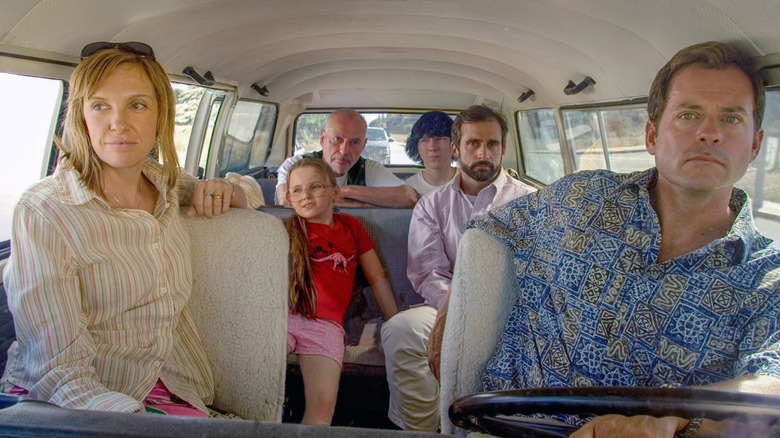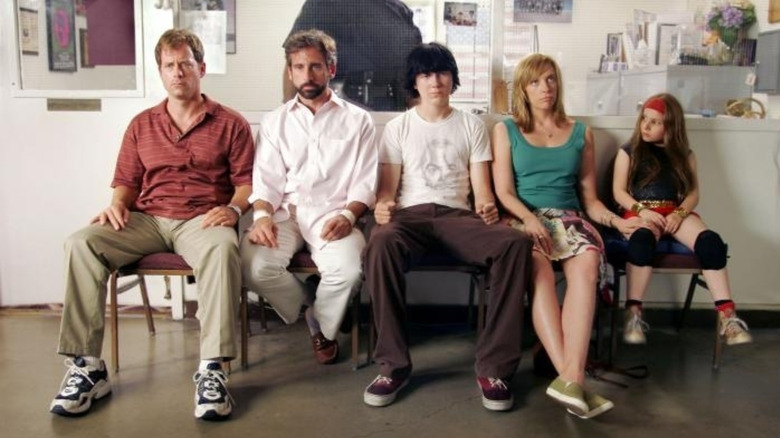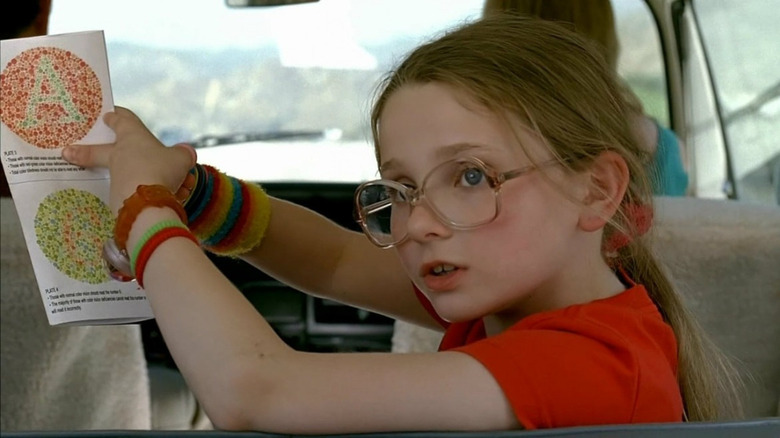Why Little Miss Sunshine Was Stuck In Limbo For More Than Half A Decade
It's hard not to love "Little Miss Sunshine." Sure, some aspects might not have aged as well as others (perhaps most prominently, its depiction of child pageants could be more nuanced), but you can't deny the earnestness and genuine love felt throughout every second of the movie. Made right in the middle of indie filmmaking's mumblecore movement, it seems like a time capsule of a very special time in American film, where you didn't necessarily need a big star producer or director to make your movie; just a good story.
However, it definitely took a while for the movie as we know it to take shape. According to the introduction of the published shooting script, screenwriter Michael Arndt started the first draft of the script all the way back in 2000, finally completing it in 2001. After he abandoned the idea of shooting it himself on a microbudget, he teamed up with Deep River Productions to find a director that would work for the project. Even after finding their directors in the duo of Valerie Faris and Jonathan Dayton, their problems with getting the film off the ground had only just begun.
It really struck a chord
It was pretty easy to convince the married duo of Dayton and Faris to sign onto the project once they read the script. In a New York Times interview published upon the premiere of "Little Miss Sunshine" at Sundance in 2006, the directors explained why making this their first feature film was an obvious choice. "This film really struck a chord," said Faris. "We felt like it was written for us."
While that win was certainly one to celebrate, it didn't guarantee that the movie would magically get fully financed. That didn't come until producer Marc Turtletaub, who was transitioning into film producing after serving as CEO of The Money Store, bought the rights to the script for $150,000. Reportedly, Turtletaub helped pitch the film to several studios but all rejected it, until they got to USA Films. Again, a situation to celebrate, but then came the question of how to find movie stars to feature in their small indie film.
Before the "Little Miss Sunshine" team could even think about casting, however, they had to weather the course of a major production shake-up. Universal, the parent company of USA Films, merged with General Electric's NBC company to create NBCUniversal. This acquisition resulted in USA Films being rebranded as Focus Features, and with this new image came some new decisions. In the same interview with the New York Times, directors Faris and Dayton explained that Focus decided to cancel their funding of "Little Miss Sunshine" in August 2004.
One last chance
After receiving news that Focus would no longer be distributing the film, Turtletaub made a risky move; he'd fund the rest of the movie himself, as he had just founded Big Beach with "Adaptation" and "Everything is Illuminated" producer Peter Saraf. According to the New York Times, the producer bought back the rights to the movie from Focus for $400,000, and threw in an additional $9 million to ensure "Little Miss Sunshine" finally got filmed.
It turns out that this was the move that finally put the film on track to eventual critical acclaim. While they weren't movie stars just yet, the production was able to snag Toni Collette, Greg Kinnear, and Steve Carrell for the movie (via Variety), lending it a good amount of industry credibility. Filming went relatively smoothly, and it wasn't until it premiered at the 2006 Sundance Film Festival where its rocky history melted away, as major studios frantically fought for the rights to release the festival favorite. Fox Searchlight Pictures eventually won the battle, releasing it in July 2006 and campaigning for it when it received a Best Picture nomination at the 2007 Academy Awards. Who would have thought that none of this would have happened had it not been for Turtletaub?
"I said: 'You know what? We'll stick our neck out,'" he said. "I'm willing to take a risk on a movie that is there to uplift and enlighten."


